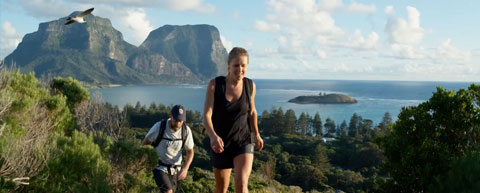Native Tucker Builds Connection to the Bush
Category: News
The intriguing world of ‘bush tucker’ is a unique part of the Classic Larapinta Trek in Comfort, Murray River Walk and The Arkaba Walk experiences, and adding yet another layer to the story of the spectacular lands these walks explore.

Native bush tucker tastings on the Classic Larapinta Trek in Comfort. Photo courtesy of Kungkas Can Cook
Also known as bush food, bush tucker is native fauna and flora used for culinary or medicinal purposes, and has been used for thousands of years for sustenance by Indigenous Australians.
Our walks in the outback regions of Northern Territory and South Australia provide rare opportunities to experience these fascinating elements of Australian traditional cuisine, and enables walkers to further connect with the lands they are exploring through the tastings of native fruits, plants and seasonings.
On the Classic Larapinta Trek in Comfort in the Northern Territory, Rayleen Brown from Kungkas Can Cook has started visiting guests at the exclusive semi-permanent Nick Murcutt’s camp to provide an informative talk on native local bush food. Rayleen’s bush tomato and quandong (Santalum acuminatum) dishes tantalise the tastebuds of eager hikers. The popular desert quandong is a tart, highly nutritious fruit that contains twice the vitamin C of an orange and is the perfect addition to a savory or sweet dish.
After a session of talking and tasting, guests are then encouraged and supported by expert guides to identify bush tucker as they continue to explore the captivating scenery of the Larapinta Trail.

Native lemon grass (Cymbopogon ambiguus) on The Arkaba Walk
Further south, on The Arkaba Walk in South Australia, the daily menu is enhanced by local bush tucker. One of the highlights for many guests is a Salt Bush kangaroo – whereby the kangaroo is smoked using local red gum and Salt Bush, a sprawling grey-blue shrub which is naturally salty. The menu also boasts a Lemon Myrtle Poached Chicken Maryland, which is infused with foraged native lemongrass (Cymbopogon ambiguus), an attractive blue-grey leaved grass with fluffy silvery flowerheads and an aromatic foliage.
Walking hosts will also prepare damper in a settler’s camp oven – baked traditionally over coals, accompanied by Salt Bush pesto and native spiced dukkha. Sitting back next to a campfire being fed from ingredients sourced from the native flora and fauna around you is a truly rejuvenating experience, and helps to illustrate the way of life for those who trod the earth before you.

Lemon Myrtle, the unsung hero of the Yabbie Bisque on the Murray River Walk
On the banks of the great River Murray, the team from the Murray River Walk are also taking advantage of local bush food.
Partnering with renowned native food specialist, Andrew Fielke, each meal includes a native element, some of which are collected while on the walking route by the expert guides. As guests explore the river land, guides share with them the array of plants that are safe for consumption, nibbling on salt bush and collecting the succulent samphire to fry up for a seafood meal garnish, there is always something new to try.
Native river mint can be found growing amongst lignum on the banks of the Murray River. This delicate herb has an aroma like that of spearmint and is used to create a river mint yoghurt, a unique accompaniment to the walks’ roast garlic and lemon lamb dish.
Lemon Myrtle is also a popular native ingredient used, with a creamy aroma of lemon and lime it is the unsung star of the signature Yabby Bisque, a rich and refreshing entrée using native yabbies, and delighting guests time and time again.
With the taste of the native flora and fauna still dancing on your taste buds as you walk, the stories of the land will come to life. We trust you will enjoy this unique way of connecting to the land and its people on your next Great Walk adventure.
Find out more about the Classic Larapinta Trek in Comfort, Nothern Territory
Find out more about The Arkaba Walk, South Australia
Find our more about the Murray River Walk, South Australia
